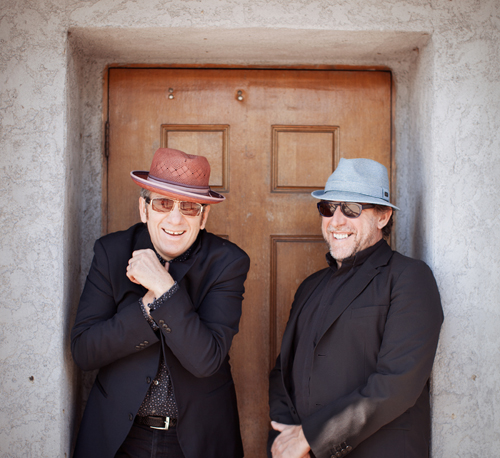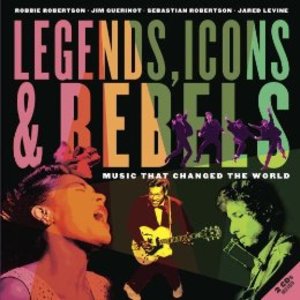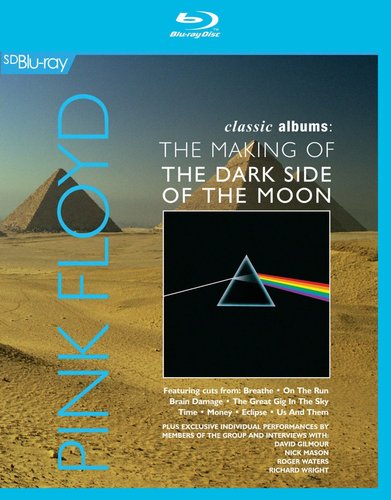A Conversation with Robbie Robertson
Mike Ragogna: Hi Robbie, how are you?
Robbie Robertson: I'm exceptionally well, and how about you?
MR: I'm especially fine after working my way through Legends, Icons & Rebels: Music That Changed The World.
RR: [laughs] Yeah.
MR: This is like an encyclopedia...no, more like a starter book on how to get into the history of rock 'n' roll. How did a project like this start?
RR: Well, that was what got me into it, what you just said is exactly it. I thought--and I've talked about this, that my son Sebastian had this experience with kids that he was working part time with. He said, "I've discovered something, that kids five years old to ten years old, say, when you play music that's supposed to be for them, it just plays in the background--'Humpty Dumpty sat on a wall,' whatever. But then when I would slip in a Marvin Gaye or Johnny Cash track, something happened in the room. These kids, the whole demeanor and rhythm of the room would change, and you would see them reacting." He would say, "Of course, I was only playing great stuff," and the fact that he and his sisters grew up in a household where, when they were young kids, they knew who Billie Holiday was, they knew who James Brown was, they knew who Chuck Berry was, they knew all of this stuff, and they had this starter kit. So from Sebastian working in this, he said to me, "Somebody should do something for kids that really gives them the foundation to, for the rest of their lives...because once you know that your musical taste is intact and you when you hear contemporary music, you know where this stuff came from, you know if it's the real deal or not, and you take this with you for the rest of your life."
So we were trying to make a book with the kind of ingredients that you take with you for the rest of your life and whether it's for parents to have this relationship with their kids or for your uncles and aunts, it's a family kind of thing where you gather around something that is so timeless and so special that if you don't have this, something's missing in your life and this isn't about touting a certain period as superior or great. There's tremendously great stuff going on today, and I think some of this music will stand the test of time but these people that are in this book from Buddy Holly to Patsy Cline, they did something better than anybody else will ever do it. It's to be able to appreciate that and understand the difference in people that made music that changed the world.
MR: Why isn't The Band in this book?
RR: I purposely didn't put The Band in this book because I didn't want anybody being distracted with whether I was tooting my own horn or not. The Band was a culmination of musicalities that is one of the reasons that The Band's music is so alive and influential today with tons of young musicians. It's because we were a combination of these people. There's gospel in there, there's blues, there's mountain music, on and on and on. There's R&B and rockabilly and everything in The Band's music, and it was one of the things that made this group so unique. So doing this book is almost like an offshoot of The Band, in a way. I'm hoping, Mike, that this book, because it has turned out so beautiful, I'm really hoping that it does get discovered and that people appreciate it because I really need to do Volume Two.
MR: Right, you can't have everyone.
RR: There are so many people that we didn't get. The Rolling Stones aren't in here, The Band isn't in here, Muddy Waters and Howlin' Wolf aren't in here, Roy Orbison isn't in here, Neil Young isn't in here. There are so many people that have made a tremendous contribution. We started out with forty-eight artists and then we got it down to thirty-six and then down to twenty-seven because the publishing company said, "We can't make this a phone book. People will become immune to it, so you're really going to have to do your starter version of this and then hopefully, we're going to do so well with this book that there will be other volumes to it and you can incorporate so many more people that it was just painful to leave out."
MR: What do you think makes certain artists iconic or have a body of work that becomes important to a culture?
RR: I think that there are masters in most things. There are true masters and I think that Hank Williams is a true master. I think that he wrote and performed some songs and that he did better than anybody else in the world. I think that Bob Dylan is a true master. I think that Louis Jordan, Chuck Berry, Little Richard, and so many other people at the beginning of rock 'n' roll... Chuck Berry said he wouldn't have even gone into music if it hadn't been for Louis Jordan. I wouldn't have gotten into music without Louis Jordan. Little Richard said the same thing; James Brown said the same thing. His impact on music was so profound that because I know what I know, I had to put him in the book. We did eliminate a lot of people, but I could not eliminate Louis Jordan because of what he did for other music people.
MR: It seems that the greats, intentionally or unintentionally, are inspired artistically by the greats.
RR: Yep, that's right. You just hand it down, and this book is meant to hand that down. Somebody said, "If you don't teach, you're not doing it." That is part of this. If you don't share this kind of thing... This book seems to be long overdue. There's a gap. There's a gap where nobody's said, "Here you go, you know about this stuff, you know about these people, their story, their music, you're set for life. You will recognize and you will bring this with you for the rest of your life and you will recognize good stuff forever because of this." And it's powerful, especially when you're trying to aim at a ten year-old kid.
MR: Why do you think this hasn't been approached before?
RR: I don't know, except that there's a gap there. And when great things come along and fill that empty space, then you do say, "God, how come nobody thought of this before?" That's usually a good sign. That's usually the way that works and that's, hopefully, the way it'll work with this.
MR: The book is pretty informative as well as loaded with pictures of the artists. You guys must have done a lot of research to put this book together.
RR: It took years!
MR: What was the process?
RR: The process was that we would get together once a week and we would talk about these different artists. Now, I have some personal experiences with a lot of these artists, and I could help in these discussions and bring it into a more personal place with everybody. It caused an excitement in the room, so we would get so deep in on this and we would talk about each of these people and what they contributed. The world just wouldn't be the same if there hadn't have been a Bob Marley. Oh, my God, what an awful thought! If we never heard Otis Redding sing in our lives, what a terrible thing that would be. So we went to these things and a lot of it was personal taste, the four of us just saying, "I don't know, I don't know." It was like, "How are you going to do this book and have Willie Nelson not be in it?" It's not fair. It's not right. Willie Nelson was originally in this, and we want Willie Nelson in Volume Two, but we had to start somewhere. It came down to years of thinking about artwork, thinking about what we would incorporate, the facts about these people that a lot of parents and grandparents don't know, and then make this book such a wonderful ride and so informative. At the same time, I want it to be kind of anti-wikipedia.
MR: Wikipedia is more sterile and fact-driven, while this is emotionally driven.
RR: It is. Wikipedia is just information; I wanted this to have heart. So when I'm talking about Elvis Presley, I say how there might have never been an Elvis Presley if he hadn't gone in and recorded a couple of songs for his mom's birthday. Sam Phillips heard those and brought him in and put him with Scotty More, Bill Black and D.J. Fontana and said, "Let's see if we can't record some things." He's the King of Rock 'n' Roll, and it was only because he was doing this for his mom on her birthday! We don't know what might have happened if he hadn't. He could've been one of those people that was really talented but never got up there or something.
MR: What are some facts things you discovered along the way that were surprising?
RR: Well, one of the things that has come up in the back of my memory is that all of these guys--Elvis Presley and Eddie Cochran and Gene Vincent--all of these rockabilly kind of guys came along, cool-looking dudes dressing sharp and all of that, and then this guy Buddy Holly comes along who wore big horn-rimmed glasses. You could recognize Buddy Holly a mile away, though, because he owned it. He went with it, and people have said, "Oh, did he wear glasses just because it would make him more recognizable in the midst of all of these other people?" No...he could hardly see! But it just worked. It worked because it was so real, you couldn't deny it.
MR: Robbie, there were four of you that put the book together including your son Sebastian, your ol' pal Jared Levine, and Jim Guerinot. How did this assembly come together?
RR: The assembly came together because, like I told you, in the beginning Sebastian planted this seed. Then after he told me about it, at some point, when I was doing a thing with Dreamworks with Jared, he and I talked about it, and he said, "God, somebody should do something about that sometime." It was one of those things on the back burner. But that we knew there was a certain validity in it that was irresistible. Then through a mutual friend, I met Jim Guerinot and this friend of mine said, "This guy is one of the smartest, most wonderful people that the music business has ever known." I'm like, "Oh, really?" and he and I have a lot of mutual friends. So I meet with Jim--he manages Trent Reznor and Gwen Stefani and all these other people, offshoots of them and everything. He has something that is kind of unique in all of this business from the way I'm looking at it. He's cut from a different cloth. He's from Orange County, he still lives there with his family and everything. So I met with Jim a couple of times and we really hit it off. Then he said, "Let's figure out something we can do together. You got anything in mind," besides the fact of him being able to help me out as a manger. So we talked about a few ideas and when I brought this idea up to him, he went, "Whoa, wait a minute, I want this for my kids! This has to be done. This is really special." From that time of us discussing it, we worked on it together for like five years to get it to this place. We did it in a whole other way originally, and it was a discovery process because we had nothing to compare this to, really. And when Jim came into it, he said, "All right, roll up your sleeves, we're going to go," and we did. He was the one that really lit the fire under a great idea.
MR: Do you want this to become a scholastic tool? Do you think this could be a text book for a potential music course for teachers in schools?
RR: I would hope so. And all of the schools in all of the places that this could play a part in is very, very exciting, and the fact that it's so physically beautiful, too, that it just doesn't look like a school book where people say, "Oh, God, this is another boring thing that I've got to learn." It looks beautiful and hopefully, pulls you in and pushes your imagination to explore more because it's just the tip of the iceberg.
MR: You also included two CDs to present musical examples.
RR: Here's something in this whole process that the outside world doesn't know...it's impossible to clear all these songs. The only reason that we were able to clear these songs is because it took a long time and a lot of money and going to these people... You can't clear Beatles songs, you can't clear Bob Dylan songs. With a lot of these songs, they say, "If you don't send me a big check, the answer's no!" We weren't sending big checks, we weren't sending any checks. We were saying, "This is a book that has a special place," and we were just trying to tell them that we were wanting to do something so special and that kids are at the front of that line. Eventually, we got messages from Paul McCartney saying, "I want this for my kid, please, this is so great!" And through time and perseverance, we got it done. That alone is a feat. The book publishing people were like, "We don't understand how you cleared that; we don't get it." So between what the book people, Tundra, brought to the table and what the four of us brought, I think it really equals what we were all looking for. We'll see.
MR: Beautiful. Robbie, what is your advice for new artists?
RR: For new artists? For new artists, go and listen endlessly to all of the twenty-seven artists in this book.
MR: [laughs] Okay, and of course that means go to Volume Two when that comes out as well, right?
RR: That's right!
MR: This is beautiful. I really appreciate your time.
RR: I really appreciate your enthusiasm for this, Mike. This is great. It's always fun to talk to you and as you can see, we're hoping this turns out to be something really special. It's about the gift. It isn't about trying to do something, it isn't about the money or anything. It really has to do with trying to present a tremendous gift to kids and the music that changed the world.
MR: Coming from the guy who was part of one of the world's best Americana acts. You know your history, sir.
RR: I know it!
MR: You do.
Transcribed by Galen Hawthorne
STEVE NIEVE & ELVIS COSTELLO'S "TENDER MOMENT"

photo credit: Ryan Schude
Longtime musical collaborators and pals Steve Nieve and Elvis Costello join forces for this exclusive audio track, "Tender Moment," that comes from Nieve's new album ToGetHer. "I truly love what we have created with ToGetHer," says Nieve, "and the thing I enjoyed the most was hearing the songs finally come to life, each time--all these strong, clear, beautiful voices coming together to help me share and give rise to my vision." He adds, "I am so blessed to have so many great musical friends who could be part of this journey to create what is, in essence, a true chorale album."
CONTROL'S "CORPSE" LIVES!
The band Control--vocalist Joseph Mayfield, and guitarists/programmer-keyboardists/background vocalists Dominic Rabalais and Joey Del Re--offer up a charming low-fi video with hi-fi audio (mastered by Erick Labson) for their re-edited, re-released video "Corpse," a social commentary explained by Mayfield below:
"The 'Corpse' video is an amalgam of my love for exploitation, and the ideas behind the song itself. I wanted the video to seem like some late night VHS viewing; I really have begun to loathe the clean video idea. The madness that comes from the brutal flaws of financial restraint are quite wonderful. The pressures of trashy minds forced to create under short time frames, now that's my bag. So I thought it would be a great connection to the ideas behind 'Corpse,' the thought of cultural control of personal persona. People think that it's about romance--a common mistake about a lot of our songs. But the love we talk about is the love of society, how dead it really is, how we are forced down and raped by the ideas of our peers to maintain this political idea of norm. It hurts us, it stops us from becoming something special. A twisted idea of 'love,' controlled by the meaning we give it. I really do believe that all of us has the potential to become great things, not just alienated Walmart workers, forced to create YouTube videos for a sense of freedom--good things in their own right, but at the same time, quite depressing that it has come this far. So the video for us was a way to have a heavy-handed message about these ideas through dark humor, and really showing that side of us. As weird as the video is, I think it's pretty damn funny."
Oh, by the way, Trouble Lights' Phillip Rabalais (Dom's brother) and Adrien Daller appear in the video.
FYI, Mr Nasti's "Always Believe" features a couple of druids...guess who. Yup, that's Joey Del Re and Joseph Mayfield of Control...
MR NASTI - Always Believe from MR NASTI on Vimeo.
And check out Control's first review of their self-titled album, interview with Control coming soon. One of the more fun reviews you'll read anywhere: http://www.desmoinesisnotboring.com/wordpress/?p=15515
PINK FLOYD'S BLU-RAY MOON
Ever wonder about how Pink Floyd's Dark Side Of The Moon was created? Well, wonder no more, and savor all the details in this new Blu-ray that takes the old Classic Albums: The Making of Pink Floyd's Dark Side Of The Moon and brings it to 2013 with more luv and clarity.





